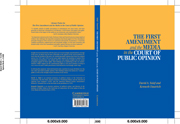Book contents
- Frontmatter
- Contents
- List of Tables and Figures
- Preface and Acknowledgments
- 1 Freedom of the Press and the Power of Public Opinion
- 2 Surveying the Public on Press Freedoms
- 3 What Americans Know About the Freedom of the Press
- 4 Public Support for the Freedom of the Press
- 5 Support for Press Freedoms Across Media: Comparing Print, Electronic, and the “New Media”
- 6 Support for Press Freedoms within a Medium: Elite, Mainstream, and Tabloid News Sources
- 7 Public Opinion, the First Amendment, and the Challenges of the Twenty-First Century
- Appendix: Annotated Questionnaires
- References
- Index
Preface and Acknowledgments
Published online by Cambridge University Press: 05 June 2012
- Frontmatter
- Contents
- List of Tables and Figures
- Preface and Acknowledgments
- 1 Freedom of the Press and the Power of Public Opinion
- 2 Surveying the Public on Press Freedoms
- 3 What Americans Know About the Freedom of the Press
- 4 Public Support for the Freedom of the Press
- 5 Support for Press Freedoms Across Media: Comparing Print, Electronic, and the “New Media”
- 6 Support for Press Freedoms within a Medium: Elite, Mainstream, and Tabloid News Sources
- 7 Public Opinion, the First Amendment, and the Challenges of the Twenty-First Century
- Appendix: Annotated Questionnaires
- References
- Index
Summary
In a democracy, civil liberties are a precious commodity. Accordingly, we often worry that those liberties have become fragile or increasingly vulnerable to assault. Are such fears well founded? In light of recent frustrations with the press over its increasingly sensationalized coverage of the news, no liberty may be more susceptible to the vagaries of the current political climate than is the constitutional guarantee of a “freedom of the press,” which in today's society encompasses print and electronic media alike. By considering public opinion data on free press rights against the backdrop of modern First Amendment jurisprudence, we seek to offer new and original insights into the nature of popular support for these rights – and, in the process, we hope to provide a more sophisticated understanding of how the U.S. democratic system actually works. Our ultimate findings in this respect are as comforting as they are counterintuitive: Specifically, we argue that public support for the constitutional right to a free press remains as strong as ever, even as its most visible practitioners find themselves increasingly under siege.
In offering this argument, we stake a position in that age-old debate over the true value and worth of public opinion. Students and practitioners of politics have long wrestled with the question of whether the masses are capable of conceptualizing (and thus meaningfully contributing to) the democratic process. Such a question is especially important when posed during times of duress, when many citizens' normal conceptions of the world are bombarded by a series of outrageous events.
- Type
- Chapter
- Information
- The First Amendment and the Media in the Court of Public Opinion , pp. viii - xiiPublisher: Cambridge University PressPrint publication year: 2002



